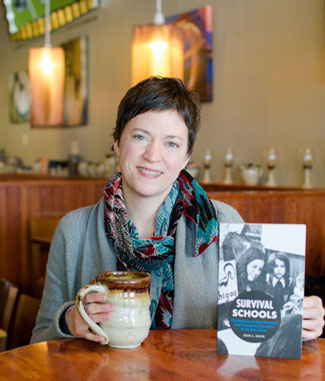And the winner is …
Julie Davis is finalist for Minnesota Book Awards
March 7, 2014
By Mike Killeen

Julie Davis took a long route to write her book, "Survival Schools: The American Indian Movement and Community Education in the Twin Cities" (2013, University of Minnesota Press).
But even when she was turning a doctoral dissertation into a 307-page book, she had one goal in mind — great writing that would keep people turning pages.
Mission accomplished. Davis' book is one of four finalists in the Minnesota category in the 26th annual Minnesota Book Awards, which will be presented Saturday, April 5, at the St. Paul Union Depot.
"For me, the Minnesota Book Awards' recognition is professionally satisfying because these awards recognize good writing, and I've always believed this was an important story and is an important history," said Davis, an associate professor of history at the College of Saint Benedict and Saint John's University.
"My ability to tell the story in a compelling way that would be accessible and interesting to a broad audience was very important to me, but I was never sure if I was going to be able to do that successfully," Davis said. "Just to feel like the book is being recognized as literature, rather than just having academic colleagues say, 'This is an important contribution to the scholarship,' was very satisfying.
"I always wanted it to be a good story, and in my head and in my heart, it was always a book — even when I was writing the dissertation," Davis added.
Schools helped youth reclaim roots
In 1972, American Indian Movement organizers and local Native American parents came together to establish their own community schools — Heart of the Earth in Minneapolis, and the Red School House in St. Paul. The schools, now closed, helped Native American youth and their families reclaim their cultural identities while building a distinctive Native American community.
Davis interviewed activists, teachers, parents and students to tell the story and record its long-term effect on their lives.
"I always wanted to try and tell the story as much as possible from the perspective of people who built the schools, worked in them, attended them and nourished them," Davis said. "That was always my goal. The oral history, which we think of as the heart of the book, was a conscious choice, but it also was a necessity because there is very little documentation with this history."
Davis was asked if she considered the schools a success.
"I interpret the schools and their legacies within the context of indigenous history in the U.S. So, I take sort of the long view," Davis said. "To me, having the vision and the courage and the creativity to imagine this kind of educational system is remarkable, when you consider the degree to which U.S. government policies had worked in a very focused way to eliminate indigenous culture and their ways of being in the world.
"A lot of this story is about organizing and organizers. Organizing a community to make that happen is remarkable. So for me, their very creation and existence is a success."
Lives improved because of schools
Davis said the primary goals of the schools were to provide a learning environment for Native American students who were struggling in the mainstream educational system "where they could feel good about being themselves ... and then use this system as a resource for community regeneration and cultural revitalization.
"A lot of individual students had their lives improved because of the schools," Davis said.
Davis, who grew up in Cass Lake, Minn., on the Leech Lake reservation, said she is looking forward to the award ceremony on April 5. It includes a reception, with a chance for attendees to buy the books and get them signed by the author.
"It's a gala, and that's part of the fun," she said. "They really make it an event. I got an email from the book awards coordinator, and she said they expect something like 900 people at the event."
Is she preparing a victory speech?
"I don't expect to win, but everybody hates it when you watch the Oscars and the people get up there (on stage) and they didn't prepare anything. So, I'll prepare something, just in case.
"I'm just thrilled to be named a finalist. Winning is not even on my radar," Davis said.
